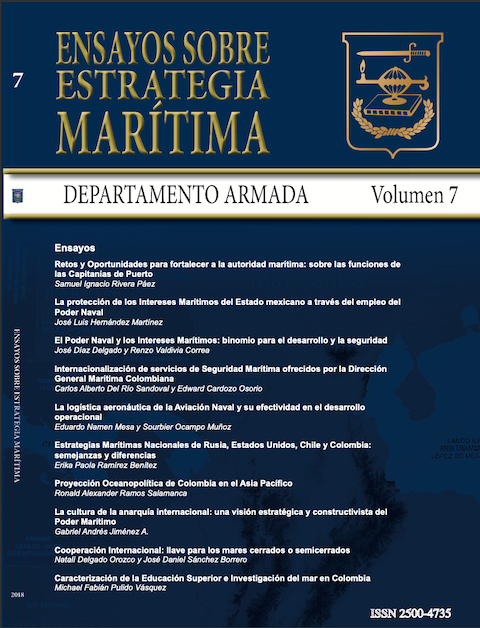Cooperación Internacional: llave para los mares cerrados o semicerrados
DOI:
https://doi.org/10.25062/2500-4735.476Keywords:
cooperation, States, closed and semi-closed seas, benefits, UnclosAbstract
Over the years it has been conceived that international cooperation, speaking in terms of collaboration between states, is the path that countries with closed and semi-closed seas should follow, not only because of its political and territorial connotation, but also because of what it arouses sound logic, all with a view to extracting economic, political, environmental and scientific benefits in a harmonious way, that is, without entering into conflicts by delimitation of its maritime territory. In this sense, the way in which the delimitation of jurisdictional waters in the Mediterranean areas (semi- closed) will be analyzed, taking as a point of reference aspects such as the geographical conformation of these spaces, and that most of the countries that occupy this jurisdictional zone- are signatories and have ratified the United Nations Convention on the Law of the Sea (Unclos), a circumstance that will come to be compared with the territorial particularities of Latin American countries that also have semi-enclosed seas and that in a similar tenor they have presented various conflicts regarding the delimitation of the maritime territory in time, all with a view to proposing a possible solution from the oceanopolitical corner.Author Biographies
Natalí Delgado Orozco, ESDEG, Colombia
José Daniel Sánchez Borrero, ESDEG, Colombia
References
Climaco Ulquill, A. J., & González López, T. R. (2005). Ventajas y Desventajas de ratificar la Convención de las Naciones Unidas sobre el Derecho del Mar por parte del Estado de El Salvador. El Salvador: Universidad del Salvador.
Dirección General de Políticas Exteriores. (2010). Aguas jurisdiccionales del Mar Negro y Mar Mediterráneo. Parlamento Europeo.
Naciones Unidas. (1982). Convención de las Naciones Unidas sobre el Derecho del Mar.
How to Cite
Downloads
Downloads
Published
Issue
Section
License
Copyright (c) 2022 Ensayos sobre Estrategia Marítima

This work is licensed under a Creative Commons Attribution-NonCommercial-NoDerivatives 4.0 International License.

| Article metrics | |
|---|---|
| Abstract views | |
| Galley vies | |
| PDF Views | |
| HTML views | |
| Other views | |
















